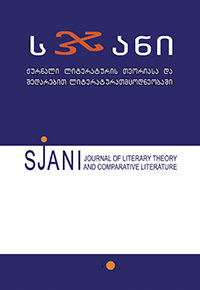ქართული მწერლობა მსოფლიო ლიტერატურის კონტექსტში
Georgian Writing in the Context of World Literature
Author(s): Levan BregadzeSubject(s): Review, Sociology of Culture, Theory of Literature
Published by: ლიტერატურის ინსტიტუტის გამომცემლობა
Keywords: Georgian Writing; World Literature;
Summary/Abstract: The publication of Pop publishing house (Ludwigsburg) of the thirteenth volume of „Caucasian Library“ in 2016 issued in German „Brief Introduction to Georgian Literature“ prepared by the co-workers of Shota Rustaveli Institute of Georgian Literature (it was published by the support of the National Center of Georgian Book). The authors of different parts of the book are Maka Elbakidze, Gaga Lomidze, Irma Ratiani, MirandaTkeshelashvili, Marine Turashvili. From the introduction by Irma Ratiani we learn that the book was prepared in the frameworks of Shota Rustaveli Institute of Georgian Literature whose name is „the role and place of Georgian Literature in the world literature“ and whose aim is „to give an opportunity to the foreign researchers and readers interested in Georgian writing and culture so that they can learn more about certain stages of the development of Georgian literature, which is not an isolated space but an integral part of the world culture“.One of the main values of the book is that here Georgian writing is considered in the context of the world literature; another advantage of it is the fact that each part of the book stands out for being compact, highly informative with a very clear style of narration. In the book under review striving of Georgian writing towards Europe is highly accented yet the role of eastern writing is presented too – its role in the process of development of Georgian literature. So, the organic fusion of western-eastern motifs and representative forms creates an original profile of Georgian literature, which will be vivid to the reader. The chapter titled „The Origins of Georgian Secular Literature: Historical-Literary Preconditions „tells us about the streams of an effective fusion of western-eastern cultures. Georgian writing (hagiography and hymnography) was entirely of an European style until the second part of the 12th century – until secular literature started in our writing. One of the preconditions of appearing such kind of literature was infatuation about Persian literature. We read in the book under review concerning this specificity of Georgian Renaissance:„As we know there were a number of countries in the Middle Ages who had a very rich orally transmitted folklore and spiritual literature but could not develop secular literature. What was the reason of the fact that in Georgian secular literature developed? Firstly, this was determined by all means by cultural contacts of Georgia with both Christian Byzantium and Muslim countries. In spite of the fact that Georgians had absolutely different positions politically, religiously and ideologically, these differences had never been the reasons of war against these countries. Georgians in the late Middle Ages considered Persians the masters of the literature. (...) However, admiration for Persian Literature had never turned into a slavish imitation. On the contrary, Georgia became a mediator between Muslim East and Christian West“.Creative adoption of the work of eastern literature helped Rustaveli’s poem be born, in which „East and West meet each other. According to the book under review „The worlds of Ferdowsi and Plato, Nizami of Ganja and Dionise of Areopaga encounter”. This fact will make “The Knight in the Panther’s Skin” as a literary phenomenon of an international value. In the chapter titled „XIX century Georgian literature – part of world literature “, the most „European“period of our writing is discussed – the epoch of Romanticism and of a critical Realism following it. The reader will learn about Georgian Romantic authors (Alexandre Chavchavadze, Grigol Orbeliani, Nikoloz Baratashvili) as well as realists (IliaChavchavadze, Vazha-Pshavela, Alexandre Kazbegi etc.). The orientation of Georgian Romantics is obvious (generally, Romanticism is a European phenomenon!), however, Asian elements are present too in their literary works (especially, in the poetry of Alexandre Chavchavadze and Grigol Orbeliani), which is not surprising at all as the interest towards East by European Romantics is widely known. Besides this, critical realism too was a very European literary direction. A vivid example of this is Ilia Chavchavadze’s whole life and literary work, which was entirely devoted to the Europeanization of his mother-land.In order to present Vazha-Pshavla’s figure as a great figure and the significance of his literary creations to the contemporary world, the quotation of Donald Rayfeld, an English Kartvelologian, is given: “Vazha-Pshavela is by far more significant author than anyone else in Georgia”. In the chapter titled “Georgian Modern” and partly in the next chapter – “Georgian Literature in the Soviet Period”, the author writes about Tiflis Avant-garde and its international significance: “In the 1910-20's artists and writers from all over the world gathered in Tbilisi. […]It was absolutely vivid that Tbilisi was one of the Avant-gardist centers in southern-eastern Europe, Caucasus and Russia”. In this part the authors write about Georgian symbolism, futurists and Dadaists,about their periodicals (“Blue Horns”, H2SO4), Niko Pirosmani, Georgian Impressionism and Expressionism. As for the last chapter of the book, whose title is “Post-Soviet Georgian Literature Against Globalization” is a brief review of Georgian Post-modernism. This publication will serve a good role of a guide-book on the international book fair of Frankfurt in 2018, where Georgia will be presented with a status of an honored guest.
Journal: სჯანი
- Issue Year: 2017
- Issue No: 18
- Page Range: 315-324
- Page Count: 10
- Language: Georgian

